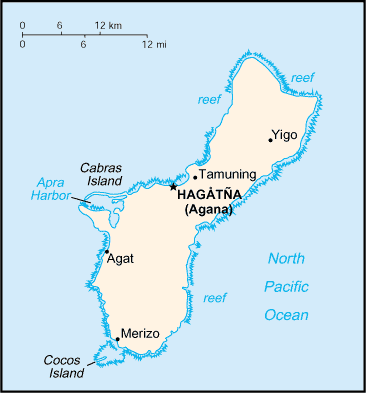|
Guam
|

|
Capital: Hagatna (Agana)
Population: 167,294
Brief History of Guam:
Guam was originally settled by the ancient civilization of the Chamorros. The first European to visit the island was Ferdinand Magellan in 1521. Later, in 1565, General Miguel de Legazpi would claim Guam for Spain. Guam would become a Spanish colony in 1668.
In 1898, the United States gained control of Guam as part of the Treaty of Paris following the Spanish-American War. The island was captured by the Japanese in 1941 during World War II. It was retaken by the US three years later. Today there is a major US military installation on the island. It is considered one of the most strategically important US bases in the Pacific Ocean.
The Geography of Guam
Total Size: 541 square km
Size Comparison: three times the size of Washington, DC
Geographical Coordinates: 13 28 N, 144 47 E
World Region or Continent: Oceania
General Terrain: volcanic origin, surrounded by coral reefs; relatively flat coralline limestone plateau (source of most fresh water), with steep coastal cliffs and narrow coastal plains in north, low hills in center, mountains in south
Geographical Low Point: Pacific Ocean 0 m
Geographical High Point: Mount Lamlam 406 m
Climate: tropical marine; generally warm and humid, moderated by northeast trade winds; dry season (January to June), rainy season (July to December); little seasonal temperature variation
Major cities: HAGATNA (capital) 153,000 (2009)
The People of Guam
Type of Government: NA
Languages Spoken: English 38.3%, Chamorro 22.2%, Philippine languages 22.2%, other Pacific island languages 6.8%, Asian languages 7%, other languages 3.5% (2000 census)
Independence: none (territory of the US)
National Holiday: Discovery Day, first Monday in March (1521)
Nationality: Guamanian(s) (US citizens)
Religions: Roman Catholic 85%, other 15% (1999 est.)
National Symbol: coconut tree
National Anthem or Song: Fanohge Chamoru (Stand Ye Guamanians)
Economy of Guam
Major Industries: US military, tourism, construction, transshipment services, concrete products, printing and publishing, food processing, textiles
Agricultural Products: fruits, copra, vegetables; eggs, pork, poultry, beef
Natural Resources: fishing (largely undeveloped), tourism (especially from Japan)
Major Exports: mostly transshipments of refined petroleum products; construction materials, fish, food and beverage products
Major Imports: petroleum and petroleum products, food, manufactured goods
Currency: US dollar (USD)
National GDP: $2,500,000,000
** Source for population (2012 est.) and GDP (2011 est.) is CIA World Factbook.
Back to Geography Home Page
